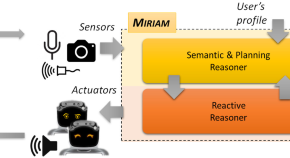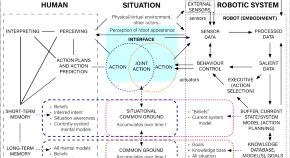Collection
Advancement on Human-Robot Interaction: perception, cognitive architecture and field tests
- Submission status
- Closed
The cooperation between humans and robots is becoming increasingly important in our society. Consequently, there is a growing interest in the development of models that can enhance the interaction between humans and robots. A key challenge in the Human-Robot Interaction (HRI) field is to provide robots with cognitive and affective capabilities, developing architectures that let them establish empathetic relationships with users. Indeed, the key challenge is how to develop a computational model that can simulate the modality human beings interact with each other. While these research topics are potentially relevant with a high social and scientific impact, there are still gaps from a scientific perspective. It is needed to have more discussions and developments, and extensive testing on the field, for improving robot capabilities and clinically validating solutions for healthcare applications. In this context, this special issue aims to: present the main results in the development of behavioral model for robot solutions; investigate the social cues to be included in the system; investigate how to tailor and personalize the HRI; investigate the role of the clinician and the therapist in user profiling; investigate how robot could be used in understanding social cognition. Reports from preliminary on the field tests will also be reported.
List of Potential Topics
1. Reviewing the state of the art in developing behavioral models, which are already deployed, as well as those being currently developed.
2. Reviewing the existing methods and approaches for studying and developing architectures.
3. Reviewing the requirements for real-world use of ICT and robots by elderly people with different needs.
4. Identifying critical barriers, including technical, clinical, assurance, regulation, etc. aspects.
5. Analyzing the relationship between the social, clinical and AI aspects in developing behavioral model.
6. Analyzing the adequacy of existing guidelines and standards and identify gaps in the current researches using a set of real-world use cases.
Editors
-
Laura Fiorini
PhD Researcher at the BioRobotics Institute, Scuola Superiore Sant’Anna, Pontedera (Pisa), Italy
-
Filippo Cavallo
Professor in the Department of Industrial Engineering, University of Florence, Florence, Italy and at the BioRobotics Institute, Scuola Superiore Sant’Anna, Pisa, Italy.
-
Gabriella Cortellessa
PhD Researcher at the Conisiglio Nazionale delle Ricerche,Istituto di Scienze e Teconologie della Cognizione, Rome, Italy.
-
Artur Serrano
Professor at the Faculty of Medicine and Health Sciences, Norwegian University of Science and Technology, Norway.
-
Marek Bundzel
Professor at the Dept. of Cybernetics and Artificial Intelligence, Technical University of Košice, Slovakia.
-
Joao Quintas
PhD Researcher at Instituto Pedro Nunes, Coimbra, Portugal.
Articles (9 in this collection)
-
-
A Mind-inspired Architecture for Adaptive HRI
Authors (first, second and last of 6)
- Alessandro Umbrico
- Riccardo De Benedictis
- Gabriella Cortellessa
- Content type: OriginalPaper
- Open Access
- Published: 25 July 2022
- Pages: 371 - 391

-
User Profiling to Enhance Clinical Assessment and Human–Robot Interaction: A Feasibility Study
Authors (first, second and last of 9)
- Laura Fiorini
- Luigi Coviello
- Filippo Cavallo
- Content type: OriginalPaper
- Open Access
- Published: 08 July 2022
- Pages: 501 - 516

-
The Role of Humans in Surgery Automation
Authors (first, second and last of 4)
- Eduard Fosch-Villaronga
- Pranav Khanna
- Bart Custers
- Content type: ReviewPaper
- Open Access
- Published: 10 April 2022
- Pages: 563 - 580

-
Integrating Social Assistive Robots, IoT, Virtual Communities and Smart Objects to Assist at-Home Independently Living Elders: the MoveCare Project
Authors (first, second and last of 17)
- Matteo Luperto
- Javier Monroy
- N. Alberto Borghese
- Content type: OriginalPaper
- Open Access
- Published: 14 February 2022
- Pages: 517 - 545

-
Improving Visual Perception of Artificial Social Companions Using a Standardized Knowledge Representation in a Human-Machine Interaction Framework
Authors
- João Quintas
- Content type: Original research
- Published: 23 January 2022
- Pages: 425 - 444

-
Knowledge Engineering Framework for IoT Robotics Applied to Smart Healthcare and Emotional Well-Being
Authors (first, second and last of 17)
- Amelie Gyrard
- Kasia Tabeau
- Masahiko Tsukamoto
- Content type: OriginalPaper
- Published: 16 November 2021
- Pages: 445 - 472

-
Exploring the Perceptions of Cognitive and Affective Capabilities of Four, Real, Physical Robots with a Decreasing Degree of Morphological Human Likeness
Authors (first, second and last of 4)
- Leopoldina Fortunati
- Anna Maria Manganelli
- Giovanni Ferrin
- Content type: OriginalPaper
- Open Access
- Published: 16 November 2021
- Pages: 547 - 561

-
Communication Models in Human–Robot Interaction: An Asymmetric MODel of ALterity in Human–Robot Interaction (AMODAL-HRI)
Authors
- Helena Anna Frijns
- Oliver Schürer
- Sabine Theresia Koeszegi
- Content type: OriginalPaper
- Open Access
- Published: 03 May 2021
- Pages: 473 - 500



